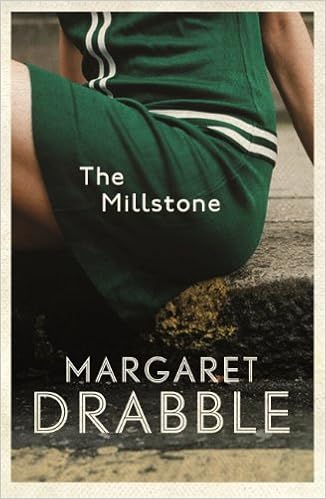 The Unconventional Book Club is back. I (the blogger) have been away travelling for a year, and the book club did continue in my absence with many a book read. However, I’ve lost track of what book number we’re on…I’d estimate 43. So that’s what I’m going with. Welcome back readers…
The Unconventional Book Club is back. I (the blogger) have been away travelling for a year, and the book club did continue in my absence with many a book read. However, I’ve lost track of what book number we’re on…I’d estimate 43. So that’s what I’m going with. Welcome back readers…
Location: The Woodman. It sounded like a herd of elephants were about to come through the ceiling, but apparently it was just a Morris dancing practice.
Category: 1960s
Margaret Drabble’s The Millstone is a tale of unmarried pregnancy in 60s Britain. A mere 50 years ago, it’s hard to imagine the scandal of having a child out of wedlock, but this was a scenario that befell many women. Drabble’s protagonist Rosamund is atypical—an academic, living in the apartment of her upper middle-class parents who are living abroad, Rosamund is in a relatively privileged position.
Other women at the time were not so lucky, often forced into mother and baby homes, and forced to have their babies adopted. Less an obvious moral tale of social injustice, The Millstone is rather a character story of Rosamund’s personal progression.
Previously avoidant of sex and physical contact, Rosamund gets pregnant the first time she ever sleeps with someone, and is then equally avoidant of deciding what to do about her pregnancy. After a brief and failed attempt at aborting the baby with a bottle of gin, her lack of decision turns into the decision to keep the baby.
She lives a life of omission, where failing to do things becomes her way of life. From a position of being oblivious to life, not even knowing how to book a doctor’s appointment, Rosamund deals with the pregnancy entirely on her own, asking no one for help. In fact, she neglects to tell most people of her pregnancy, including her parents. Instead, she captures, objectively, the details of her appointments and interactions.
Yet when baby Octavia is born, Rosamund becomes warmer and more open, with an overwhelming desire to care for her daughter. Her pregnancy breaks down the barriers as she must face the physical “bodily” aspects of life on her own. As one of our book clubbers put it, “the baby was the making of her, and actually not a millstone at all”.
A quick and easy read, The Millstone is well written, and the narration style really embodied Rosamund’s academic, no common sense, character. Considering how otherwise well-drawn Rosamund’s character is, it is somewhat hard to believe that she so easily gives up her previously heavily-guarded virginity. What could have been an overly moralising or depressing story is instead a comfortable balance of factual and amusing. For us, The Millstone fractured opinion, from “really enjoyed it” to “a chore”.
There was some disappointment that The Millstone featured less of the swinging 60s and more of the British Library, but the novel is quintessentially British. From inviting relatives you don’t really like to dinner because “you should”, to having banal conversations in difficult scenarios rather than talking about the important things, to just accepting the situation and “getting on with it”.
The Millstone is an important piece of British social history, detailing a time when a single woman having a child on their own was considered a disgrace. Let it make us grateful that times have moved on.
Score: 6.5










































